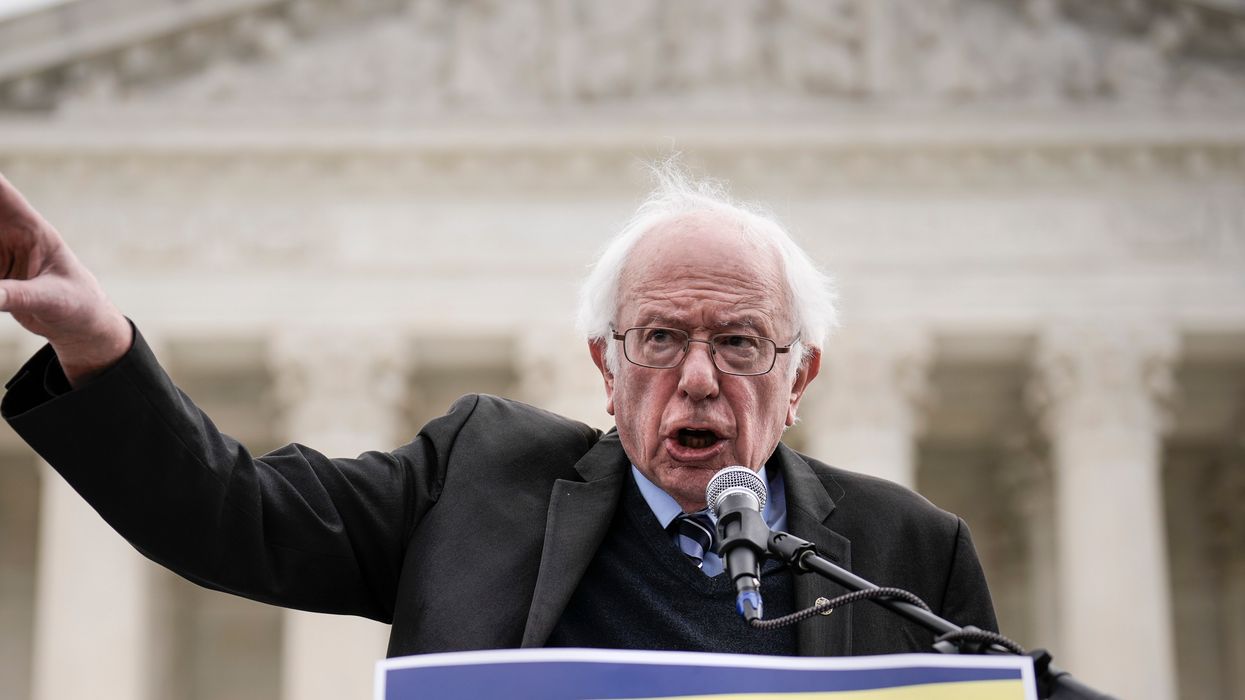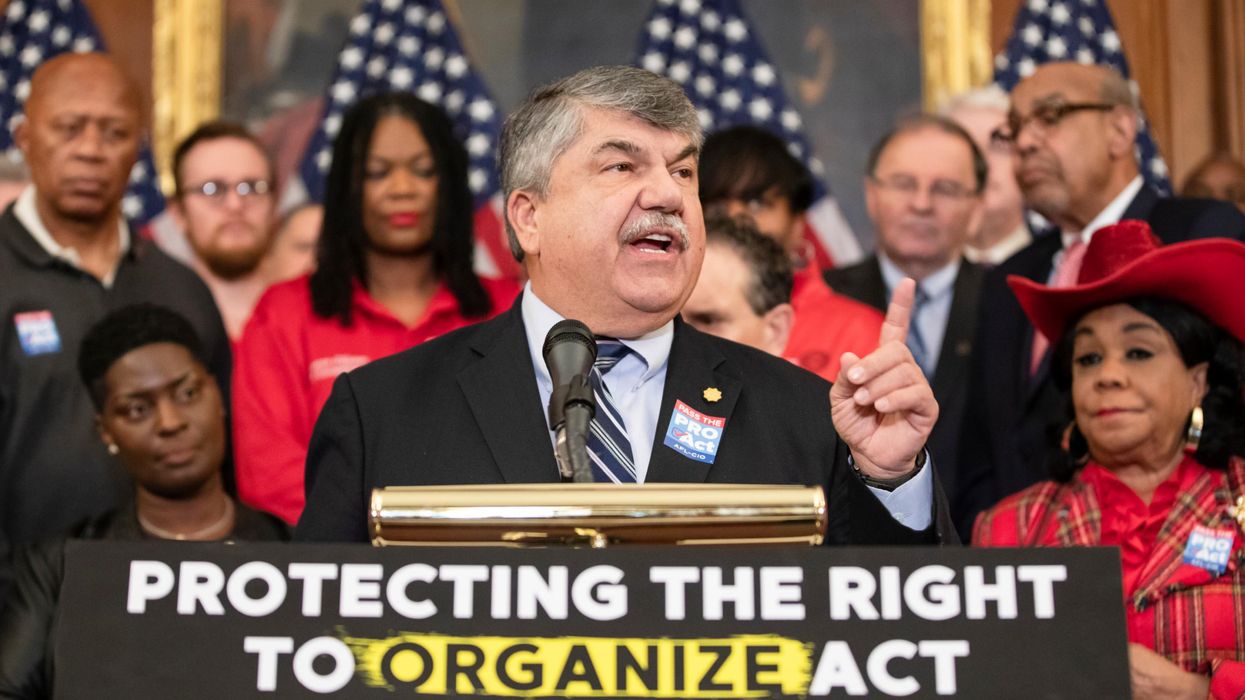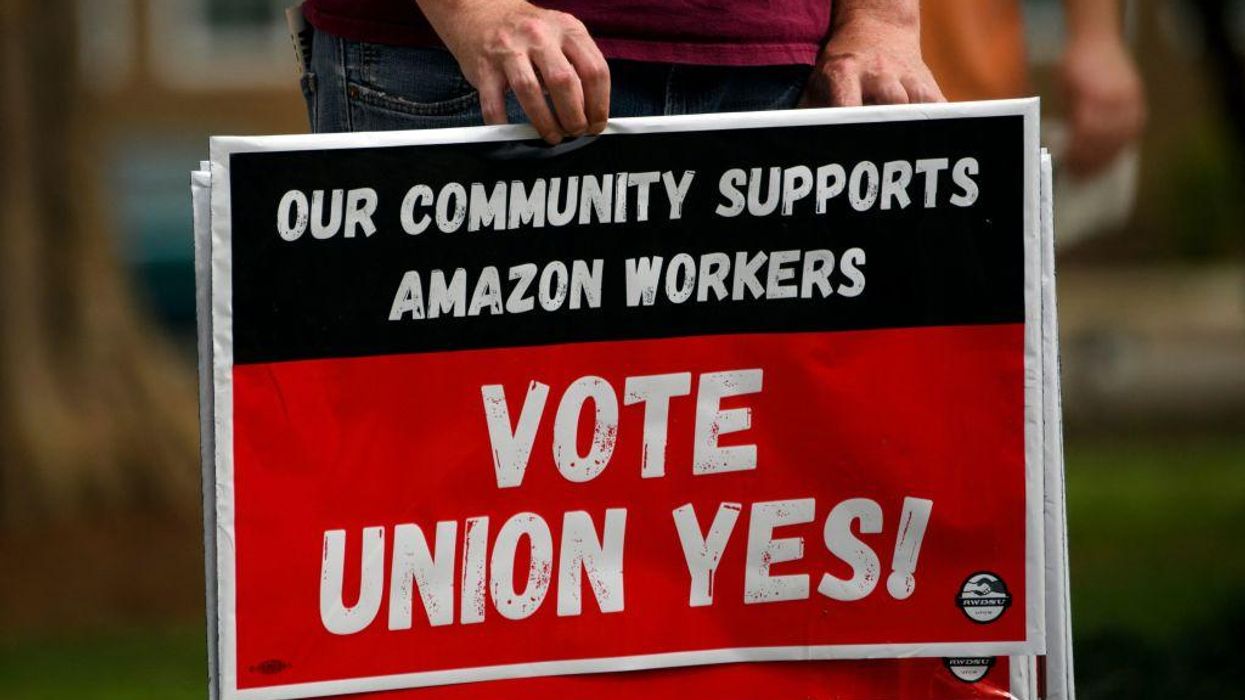Sanders, Democrats, and a Lone Republican Revive PRO Act to Strengthen Workers' Rights
"We need to hold CEOs accountable for flagrantly violating labor laws, illegally firing pro-union workers, and closing down pro-union shops."
Following a year in which strike activity surged and public approval of unions reached its highest point in nearly six decades, Sen. Bernie Sanders joined Democratic lawmakers and a lone Republican on Tuesday in reintroducing legislation that would strengthen workers' organizing rights and crack down on corporate union-busting.
Named after the late labor leader Richard Trumka, the Richard L. Trumka Protecting the Right to Organize (PRO) Act would, among other changes, give unions and employers the ability to override state-level "right to work" laws, enhance strike protections, ban anti-union "captive audience" meetings, and empower the National Labor Relations Board (NLRB) to impose monetary penalties on companies that violate workers' rights.
"At a time of massive income and wealth inequality, when too many workers are falling further and further behind, we need to make it easier for workers to exercise their constitutional right to form a union and collectively bargain for better wages, benefits, and working conditions," said Sanders, chair of the Senate Health, Education, Labor, and Pensions Committee.
"We need to hold CEOs accountable for flagrantly violating labor laws, illegally firing pro-union workers, and closing down pro-union shops," the Vermont senator continued. "If we are going to reverse the 40-year decline of the middle class, reduce the widening gap between the billionaire class and everyone else, and take on the unprecedented level of corporate greed in America, we have got to rebuild the trade union movement. That is what the PRO Act is all about and I am proud to be introducing this bill in the Senate."
Rep. Bobby Scott (D-Va.), who led the bill's reintroduction in the House, said that "Congress has an urgent responsibility to ensure that workers can join a union and negotiate for higher pay, better benefits, and safer workplaces."
"Passing the PRO Act is the most critical step we can take this Congress to achieve that goal," said Scott, the top Democrat on the House Education and Workforce Committee. "I urge my House and Senate colleagues on both sides of the aisle to join me in advancing the most significant update for workers’ labor organizing rights in more than eight decades."
Even amid high public support for unions and successful organizing drives at Starbucks and other prominent companies across the nation, the percentage of U.S. wage and salary workers who were union members last year was just 10.1%—a historic low that experts attribute to inadequate labor protections and relentless union-busting by corporations.
"While unionization levels increased in 2022, the share of workers in a union decreased despite a substantial amount of union activity and extremely high union popularity, and that drop is part of a decades-long decline in unionization," Heidi Shierholz, Margaret Poydock, and Celine McNicholas of the Economic Policy Institute wrote earlier this year.
"The decline is occurring not because workers don't want unions, but because our current system of labor law is broken," they argued. "Recent worker organizing efforts send a clear message that workers want unions. We must therefore adopt policies that make it easier for workers to form unions. At the federal level, the Protecting the Right to Organize (PRO) Act provides a comprehensive set of reforms that would strengthen private-sector workers’ right to form a union and engage in collective bargaining."
"With CEOs spending $340 million a year on union-busting tactics to intimidate and silence workers seeking to form unions, the deck has never been more stacked against workers speaking out."
The PRO Act passed the House in both 2020 and 2021 but never reached the floor for a vote in the Senate, where the legislative filibuster requires at least 60 votes to pass most bills. Last year, Sens. Kyrsten Sinema (I-Ariz.), Mark Kelly (D-Ariz.), and Senate Republicansrefused to back the bill, which is furiously opposed by corporate lobbying organizations such as the U.S. Chamber of Commerce.
"The PRO Act is how we level the playing field," AFL-CIO president Liz Shuler said in a statement Tuesday. "It is how we stop the intimidation, the lies. This is how we let workers, not wealthy corporations, decide for themselves if they want the power of a union."
Rep. Brian Fitzpatrick (R-Pa.) was the only Republican to join Sanders and congressional Democrats in reintroducing the PRO Act, which received just five GOP yes votes—including Fitzpatrick's—when it passed in 2021. The bill's legislative hurdles are likely even steeper in the present with Republicans in control of the House.
Mark Zuckerman, president of The Century Foundation (TCF), nevertheless applauded lawmakers for reviving "one of the most ambitious and comprehensive attempts to fix our broken labor laws to date."
"Not only does the legislation ban the most commonly used union-busting techniques, it strengthens workers' fundamental right to strike and ensures that millions of workers currently excluded from labor law protections due to misclassification have an equal right to join a union," said Zuckerman. "Perhaps most importantly, the PRO Act would treat labor rights as civil rights—an idea that TCF has helped push into the mainstream for years."
The Worker Power Coalition, an alliance of national labor, climate, and progressive groups representing 24 million workers, also applauded the bill's reintroduction, calling the PRO Act "the best opportunity in generations to unrig our economy for working people."
"As
Starbucks and Amazon union campaigns have sparked a national wave of worker activism with new union elections up 58 percent in just the first half of 2022, there has never been a more urgent time to ensure workers have an even playing field by fixing our outdated, broken labor laws," the coalition said. "With CEOs spending $340 million a year on union-busting tactics to intimidate and silence workers seeking to form unions, the deck has never been more stacked against workers speaking out."


